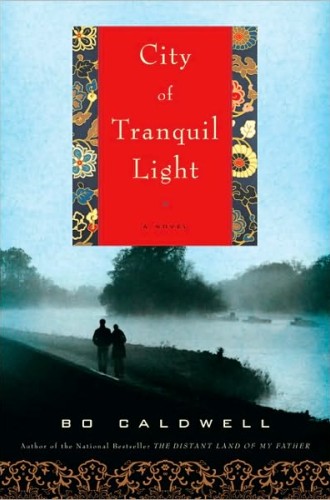A review of City of Tranquil Light
If Barbara Kingsolver's masterpiece The Poisonwood Bible has formed your image of Christian missionaries in the 20th century, you need an equal and opposite set of characters to round out (not replace) your historical, theological and literary imagination. Bo Caldwell's characters Will and Katherine Kiehn are not as dramatic as Kingsolver's Nathan and Orleanna Price, but their quiet faith, love of their adopted country and devotion to each other will stir all but the most callous readers. If you are immune to quietness as a form of passion and simplicity as beauty, beware. Otherwise, you are in for a treat. This is a great book.
The narrator of this tale, Will Kiehn, is an unlikely hero—clumsy, slow, sometimes lazy, by his own confession. A Mennonite farm boy from Oklahoma, he is so humble that he thinks his biggest sin is pride. Having heard a clear call to go to China, he leaves his home and family and joins a company of other missionaries, including Katherine Friesen, the 22-year-old deaconess he will later marry.
Read our latest issue or browse back issues.
The book opens in the 1960s with an elderly Kiehn in a California retirement community, reflecting over his past and remembering a place—Kuang P'ing Ch'eng—City of Tranquil Light. A widower, he cherishes his Chinese Bible, his German Bible (the language of his parents) and his wife's journal chronicling their 27 years as missionaries. An encounter with a Chinese-American Fuller Brush man who recognizes him as "mu shih"—the "shepherd-teacher" who baptized him in China—sets the stage for the opening chapters describing Will's religious heritage and his Mennonite formation on the plains of Oklahoma.
The scene then shifts to the year 1906, when both Will and Katherine set sail for China. We follow them through their introductory culture shock to their demure courtship, quiet marriage and posting as the only Westerners in Kuang P'ing Ch'eng. Will narrates in the past tense, while excerpts from Katherine's journal offer the contrasting immediacy of the same scenes in real time. Her italicized words bring her to life as her own character, full of vivacious energy even though she suffers from headaches and low physical stamina. She applies her medical skills to the amazement and gratitude of the villagers. Will learns to preach. And slowly a church begins to form.
In the midst of early success comes the greatest blessing of all—a daughter named Lily. But Lily dies, and the plot of the novel pivots around her death and the fact that the medical supplies that could have cured her dysentery were stolen by a bandit named Hsiao Lao who then continues to enter and exit their lives through wars, famines, floods and other near-death experiences. The book concludes after Katherine's death, when Will's mind returns to the remembered deepest places in his soul. His room is on the west side of the retirement home—the side closest to China.
Faith is the most obvious theme of this book. Will and Katherine both learn the lesson early in their sojourn that China will not bend toward them. They need to listen and bend toward China, trusting God to be wiser than they are. They usually do so gracefully, and with difficulty at other times. Their church grows not from hellfire preaching but the same way Jesus grew his motley band of followers—through the telling of stories and ministry to human need. Will and Katherine lived their evangelism as much as preached it—clothing the naked, feeding the hungry, binding the wounded. They applied to missions the principal rule of medicine: first, do no harm.
But this is not a theological tract or a short course in up-to-date missiology. Caldwell's vision stretches beyond admiration for faithful simplicity and for storytelling about the adventures of ordinary people in extraordinary circumstances. She connects the lives of Will and Katherine with a life force that emanates from the land, with memory older than time, and with the great traditions in literature.
On nearly every page of this book lie traces of another great book. The simple conversion story in which Will kneels beside the plow in his field contains echoes of St. Augustine, E. E. Cummings, Francis Thompson, St. Paul and Gerard Manley Hopkins. When Will's father, who might have been angry to see his son leave the farm, instead embraces him, saying, "You have chosen the better part. How could I refuse you?" he is the archetypal good father, echoing the words of Jesus himself in Luke 10:42: "Mary has chosen the better part, which shall not be taken away from her."
The two books that came to my mind most often when I was reading this one were Willa Cather's Death Comes for the Archbishop and Marilynne Robinson's Gilead. In addition to the quiet mystical experiences of their main characters, these novels' deepest spiritual lessons are rooted in the power of place. Will describes how this kind of love penetrates:
Each morning when I begin my daily walk, I start out by heading west, toward China. At times my life there seems almost imagined; bandits and soldiers and magistrates, floods and droughts and famines and war, seem as distant as the moon. On other days it is the present that feels imagined and Kuang P'ing Ch'eng that seems more real than the poached egg and toast I eat for breakfast. Certain smells make China instantly real to me: anything cooked with garlic, freshly cut wood, antiseptic, the crispness of the air on the first autumn day. These scents stop me in my tracks.
As he kneels by his bed at night, in a scene reminiscent of his conversion years before in an Oklahoma field, Will gives thanks for his parents and for Katherine and Lily, then works his way from the names of his Chinese friends to the City of Tranquil Light itself and to the country where he can no longer go. As his heart settles on China, he feels a familiar homesickness, a gift that tells him this earth is not his home.
Joseph Conrad and Barbara Kingsolver took us to the heart of darkness. Caldwell arouses the hope, even the conviction, that beyond darkness of all kinds lies a heavenly city—a city of tranquil light.







